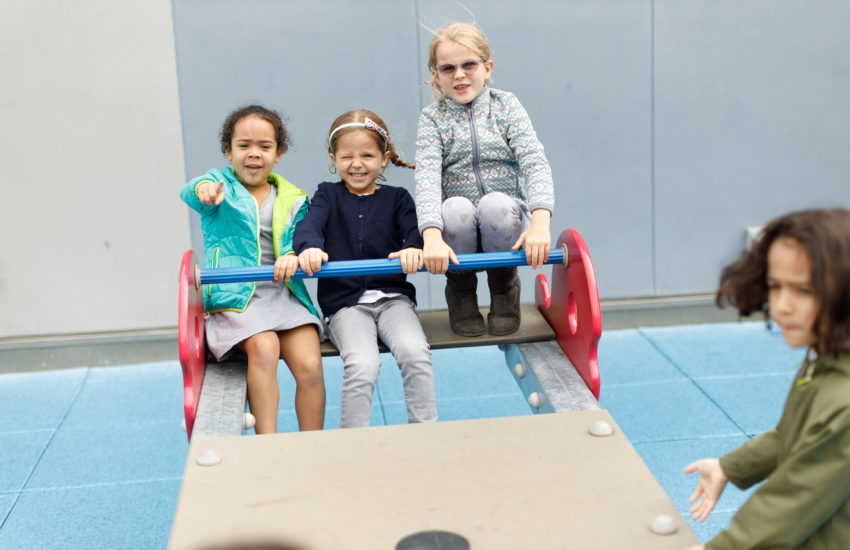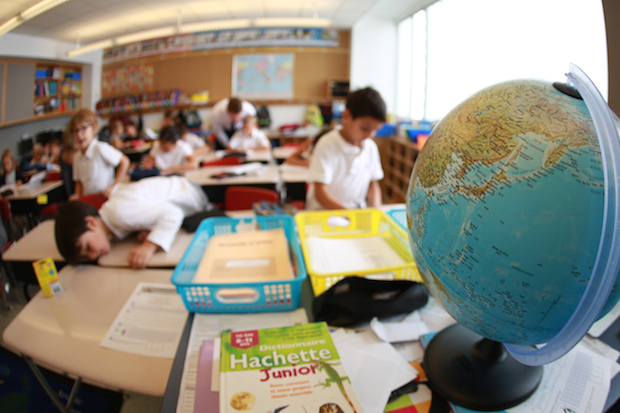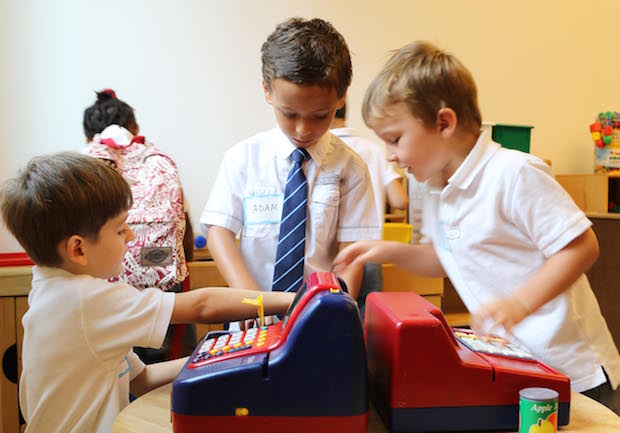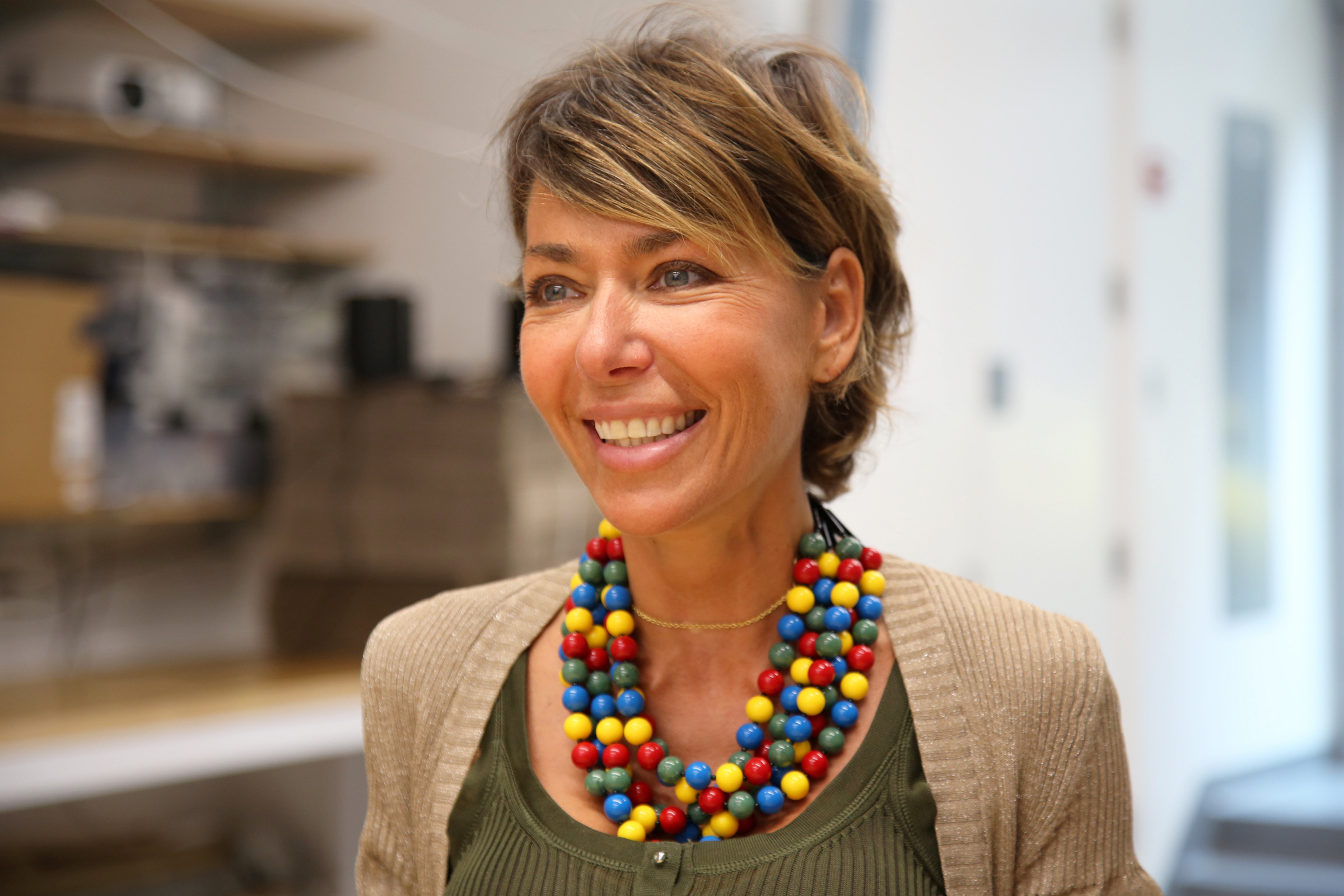For many Lycée students and parents, the 2015-2016 school year is their first experience in a bilingual school. Choosing a bilingual school is a tremendous opportunity for monolingual families, but it also raises questions about how being in a bilingual school impacts language development in children.
The most important element in the ability of children to develop two languages is helping them appreciate the experience of communication.
Parents often ask, “Does my child have the ability to learn in two languages? Will she or he be able to master both languages equally? How do I support and make it easier for my child to develop both languages?”
To answer these questions, we have to start with the factors at play in bilingualism. All children are born with the ability to speak multiple languages, but not all children are exposed to that opportunity. Paradoxically, the most important element in the ability to develop two languages is not the language itself. Rather, it starts with helping children to appreciate the experience of communication – talking, expressing oneself, should be seen as a fun, joyful and also serene.
Teaching the pleasure of communicating
Parents (and even teachers) of bilingual children are sometimes too anxious about the purity of each language spoken by a bilingual child. They want to know about a child’s ability to separate the two, or how his or her intellectual capacity (reflection, analysis, memorization, etc.) is affected by bilingualism.
Language serves first and foremost to share information, establish relationships with others, to play, to tell stories, to make friends, to work in groups.
Language serves first and foremost to help us communicate. We use language to share information, establish relationships with others, to play, to tell stories, to make friends, to work in groups. The experience of communicating should be a source of happiness and pleasure for a young children.
“Language ego”
Bilingual children who sense that their ability to express themselves in two languages is validated, and that it’s okay to make a mistake or to experiment will be better able to see bilingualism as a gift and will more naturally develop strong competencies in both languages. Parents who react to the slightest error in syntax, grammar or vocabulary, or who worry when children move from one language to another are unknowingly turning the experience from a source of experimentation and joy to one of anxiety.
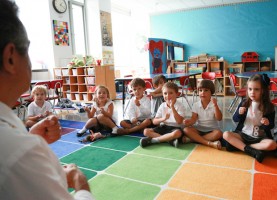 Children’s attitudes with regards to their language development depend on how we adults talk about language.
Children’s attitudes with regards to their language development depend on how we adults talk about language.
How we adults talk about language is important in the learning process. Children’s attitudes with regards to their language development depend on it. Children who marvel at their progress, no matter how small, who feel pride in their ability to speak two languages (or more!), and who are enthusiastic when they try to speak in one language or the other, will develop a strong “language ego”–essential to becoming bilingual..
At their own pace
As with monolingual children, it is rare that a bilingual child does not succeed in developing at least one strong language. Encouragement and engagement by adults will always have a positive effect.
That said, the speed and ease with which language is developed will depend from one child to another. Some children move quickly and early, others develop language later. It’s the same for bilingual children. Parents of very young children in bilingual households or schools worry when bilingualism is slow to take hold.
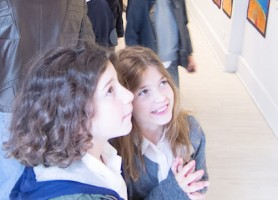 Every child develops his language at his own pace.
Every child develops his language at his own pace.
The ease with which a child develops language has nothing to do with his or her cognitive ability. Sometimes the best children in the class develop language more slowly than their classmates. The relationship between children’s intelligence and their ability to express themselves is weak, and it is certainly not a predictor of academic success. In addition, bilingual children do not develop their bilingualism the same way – family circumstances, the environment around them, instruction are all determining factors.
Bilingualism a language in and of itself
Comparing a bilingual child to a monolingual one doesn’t make sense — comparisons can often lead to a misunderstanding of a child’s real language competency in either or both languages. Bilingualism should be considered as a type of language in and of itself, rather than the juxtaposition of two independent language systems that never intersect.
We also know that the formula for the speed at which a child develops both languages is complex: the child’s personality, aptitude for speaking, the quality and quantity of social interaction in the two languages, the attitude of the family, and social support and emotional life all play a part in language development.
Parents can become anxious when bilingualism takes a long time to take hold, especially so in young children who are just the beginning of their learning.
Language development, whether monolingual or bilingual, can be understood as an endurance course: some children go great distances very quickly, while others take longer, and yet all cross the finish line. For some children it will be very easy, and for others it will require more patience and effort. Parents are spectators, and can become anxious when bilingualism takes a long time to take hold, especially so in young children who are just the beginning of their learning.
Learning to speak in two languages is an experience that takes time (and much more so than learning to run). This marathon is a lifelong one!
About the Author :
Vannina Boussouf grew up on the Mediterranean island of Corsica, where bilingualism is an integral part of identity. She studied English and Spanish at the University of Corsica, and philology and letters in Cordoba, Spain, before starting a career as an elementary teacher and administrator. Vannina relocated to the United States in 2004, where she taught at the International School in Louisiana. She joined the Lycée in 2007 to direct the Primary School, and during her tenure, she has focused on innovative teaching methods that support the development of the whole child in a bilingual setting.

